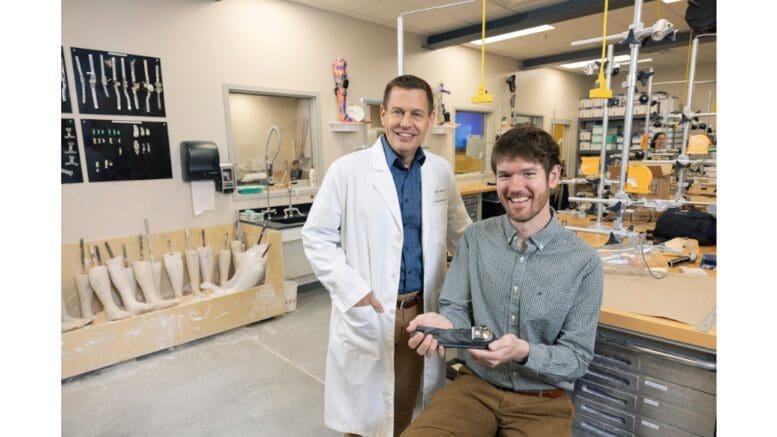Photo of Mark Geil and Harrison Bartlett: by Darnell Wilburn Jr./Kennesaw State University
This article by David Shelles first appeared on the Kennesaw State University website, republished with permission
A Kennesaw State University researcher is partnering with a local company to refine and test a new type of prosthetic foot that enhances function for people with long residual limbs.
Professor of exercise science Mark Geil received a grant from the National Institutes of Health’s Small Business Innovation Research (SBIR) program to fund the work.
“The NIH realizes that a lot of small businesses don’t have the research infrastructure that universities do, and a lot of universities aren’t great at product development, marketing and all the things that small businesses are good at,” said Geil, who is also associate dean for research in the Wellstar College of Health and Human Services. “I’m a researcher, and that’s what I know. The NIH project puts the two together.”
Geil, along with students in the Master of Science in Prosthetics and Orthotics (MSPO) program, will work with Little Room Innovations, an Atlanta-based company that creates artificial limbs (prostheses) and corrective braces (orthoses). Little Room co-founder Harrison Bartlett contacted him several months ago, and while Geil said the initial contact surprised him, his background in engineering as well as his successful track record in research no doubt helped lead company officials to seek him out. It also helps that KSU has the Southeast’s newest master’s program in prosthetics and orthotics.
“Because there are so few MSPO programs in the country, you are automatically noticed as a university that works in the prosthetics and orthotics and rehabilitation science space,” Geil said. “So that was a bit of a magnet for us, which is a really positive thing.”
Geil and Little Room are testing a prototype that improves upon the traditional rigid prosthetic foot by using a triangular keel inspired by the suspension used in pickup trucks. That keel will make the new foot more flexible and versatile for people with longer residual limbs. Geil said Kennesaw State’s MSPO fabrication lab has a couple of different slopes and a set of stairs that are useful for testing the new prosthetic foot in everyday activities.
“The process of this NIH grant will be to take the prototype and put it on people who have a long residual limb and use the current low-profile foot that we think is too stiff,” Geil said. “Along with the stairs and slope, we’ll test the foot in the biomechanics lab to make sure people can move efficiently with the flexible foot.”
In addition to development of the device, the grant will pay people with limb loss to participate in studies, as well as pay for a high school student with an interest in biomedical engineering to participate on Geil’s team. Two students enrolled in Kennesaw State’s Master of Science in Prosthetics and Orthotics program will use their required Capstone projects to work with Geil on the effort.
Geil said KSU’s Innovation Launchpad helped get a patent for the prototype, too, which increases the speed at which Little Room can get the foot to market and patients who need it.
“One of the nice things about the SBIR mechanism is we’re in a phase one trial now, and hopefully the results will be promising and will move to a phase two, which is longer term,” Geil said. “It’s getting it out in the world with a lot more subjects.”
